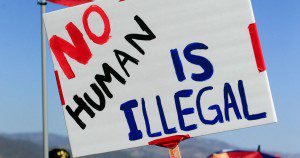One role of religion in human society is to continually affirm that the fears and anxieties about those outside a society are uniquely real, to use the expression of Clifford Geertz.
I sit at the Parliament of the World’s Religions; a gathering of those dedicated in the name of religion to overcoming hatred among peoples. So it may seem strange to talk about religion affirming fear and anxiety of the other. After all, the parliamentarians here in Salt Lake City are dedicated to highlighting the aspects of their traditions that affirmation a shared humanity.
But their religious vision is a half truth still trying to become a whole truth. Look at marriage laws. Muslims, Christians, Jews, Hindus, Sikhs, Jains, and most other religions forbid their followers from marrying outside the religious community. And if it is allowed it is only in circumstances in which the children will become members of the community. The perpetuation of religious (and almost always ethnic) purity is of highest importance.
Or read the scriptures of the so-called Abrahamic faiths. For all their affirmations of the unity of humanity they are also filled with fear and loathing of non-Jews, or non-Christians, or non-Muslims, depending on their primary audience. And in these xenophobic modes the god they celebrate is ever ready to perpetuate genocide whether in the realm of history or beyond.
And male fear and anxiety about women? Not merely written across the male recorded scriptural tradition but perpetuated in almost all religious institutions. No one could fail to note that while more than half the speakers at the Parliament will be women, 100% of those on stage at the opening ceremony of the Parliament were men. And they all came from traditions that explicitly exclude women from ritual leadership. When two women were included in the closing prayers it took some jockeying of physical position to make sure that certain male religious leaders were not obliged to even hold the hand of a woman. Anxiety about impurity; misogyny written into religious conviction.
So even at a religious event created to foster mutual understanding and respect the deep veins of religiously justified xenophobia can be seen throbbing beneath the surface. How surprising is it that they erupt in bloodshed around the world?
Inter-religious dialogue is, of course, enormously helpful in breaking down walls of prejudice and misunderstanding. And these religious leaders are no doubt sincere in their belief that the God they worship or Transcendent reality they embrace seeks human unity and peace. But dialogue cannot remove the fear and anxiety affirming swaths of scripture and religious tradition. These remain ever ready as a resource for those seeking either the solace of having their deepest fears affirmed by God, or those ready to manipulate the fearful for personal or political gain.
It remains to be seen whether the religious leaders at the Parliament of the World’s Religions have the courage to disavow those justifications of fear and loathing and cast out the genocidal misogynist deities that so frequently dance upon their altars. Dialogue is good, but we may need an exorcism even more. I’ll be waiting.











